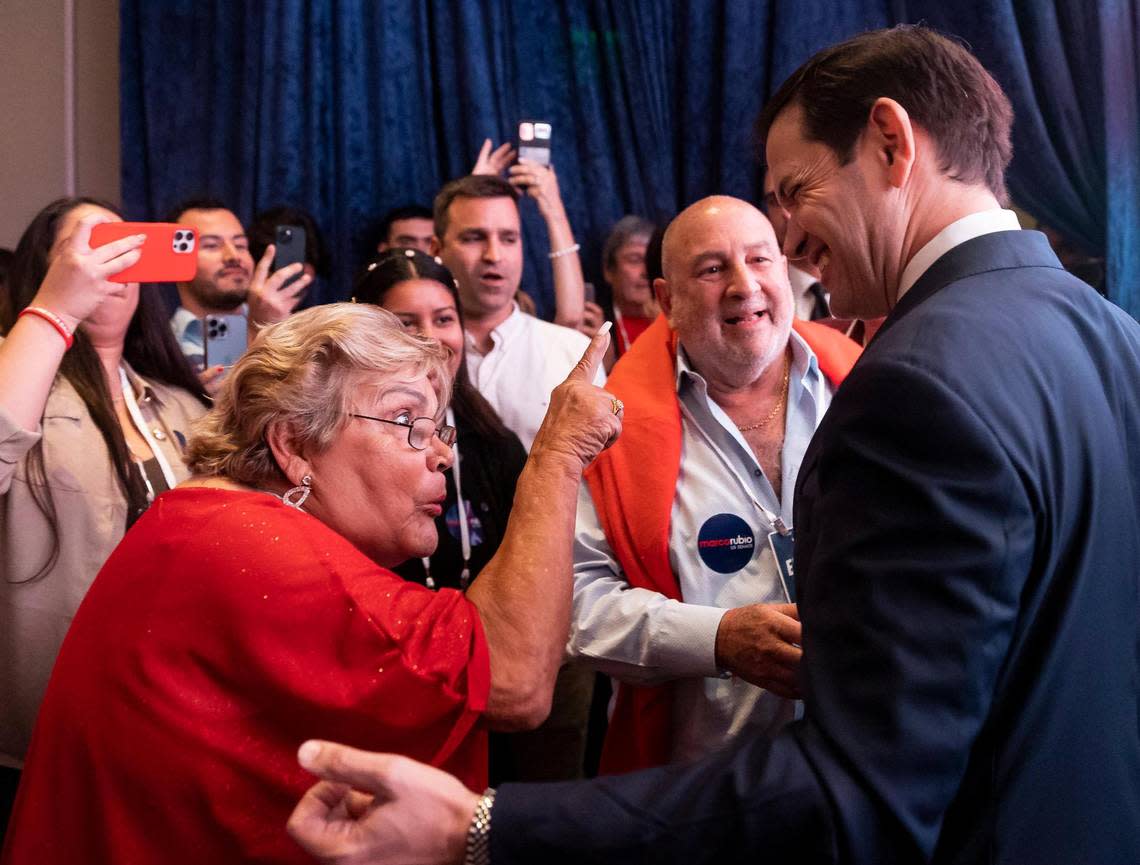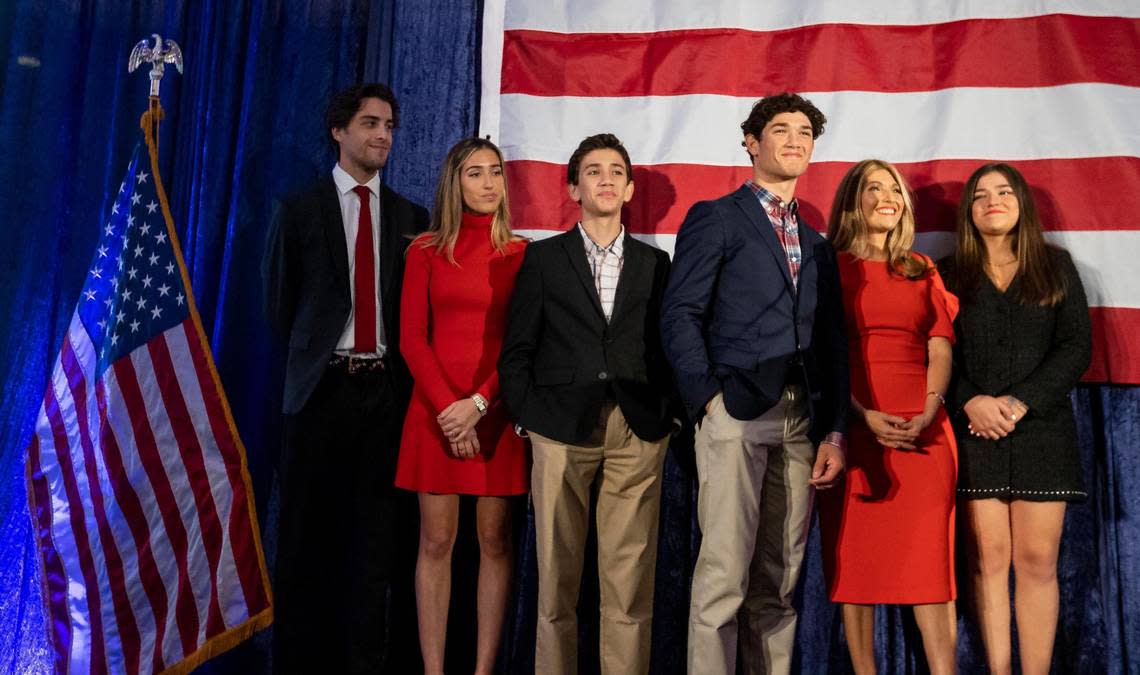Rubio beats Demings, makes Florida GOP history with third term in the U.S. Senate
Sen. Marco Rubio won reelection Tuesday, comfortably defeating Democratic opponent Val Demings in a race defined by pervasive economic pessimism and the national Democratic Party’s reluctance to compete in a state increasingly seen as a conservative stronghold.
With the victory, Rubio, 51, becomes the first Republican U.S. senator in Florida history to win a third term in office — and cements his place as one of the most consequential GOP politicians of his era in the state even as his national political ambitions remain thwarted for the time being.
The Associated Press called the race for Rubio shortly after all polling stations in the state closed at 8 p.m. With most the vote in around 10 p.m. and more than 7 million ballots cast, the Republican incumbent held a lead of more than 1 million votes.
Appearing on stage at his election night party in Miami, the senator said Democrats lost races for governor and senator because they’re out of touch, citing their positions on crime, immigration and the environment.
“The people who make this country great have been forgotten and left behind,” he said.

People of all backgrounds in Florida have joined together to “restore common sense,” Rubio said.
“After tonight, the Republican Party will never be the same, and that’s a great thing for America,” he said. “You know what we call people who are Black, white, Hispanic, Asian and are men and women, who come from other countries? You know what we call them in Florida? We call them Americans.”
The loss leaves Demings, a three-term congresswoman from Orlando, with an uncertain future in politics little more than two years after she was considered a potential running mate for then-presidential candidate Joe Biden.
Despite being an underdog, she impressed many Democrats with her prodigious fundraising and dogged criticism of Rubio. But in a state now dominated by Republicans, and her seat in the U.S. House filled, she has no obvious path forward to future office in Florida.
For her part, Demings, speaking at an Orlando watch party, said she was grateful to her campaign staff and to her family.
“I am not tired. I am not weary, and when I look around and see your faces, I am not defeated!” Demings said just minutes after her race was called. “This election may be over, but there are dreams that are still alive.”
Cruising to victory
Rubio never appeared seriously threatened by Demings, overcoming her fundraising edge and law-enforcement background to lead in nearly every public poll of the race.
The lack of drama was a change from Rubio’s past Senate races. In 2010, he ran a successful insurgent campaign against then-GOP Gov. Charlie Crist, beating him in a Republican primary and later in the general election, when Crist ran as an independent candidate.
In 2016, Rubio initially opted against running for reelection, choosing instead to seek the GOP’s presidential nomination. At the time, he said he would either win the nomination or become a private citizen.
But in June of that year, after Donald Trump crushed his presidential aspirations, he reversed himself, deciding to run again for Senate in part, he said at the time, because of the Pulse nightclub shooting in Orlando that left 49 people dead.
He went on to easily defeat the Democratic Senate nominee, former U.S. Rep. Patrick Murphy, in the general election.
This year, Rubio’s campaign capitalized on deep concerns over the state of the economy, inflation, and Biden’s management of both. A Suffolk University/USA Today poll from September found that just 37% of voters rated the state’s economy as excellent or good, while 62% said it was fair or poor.
One-third of voters listed inflation and the economy as their top concern, the survey found, far higher than any other issue.

On the campaign trail, Rubio also regularly touted his hand in the passage of the Paycheck Protection Program, a nearly trillion-dollar business loan program approved by Congress in 2020 to lessen the financial hardships imposed by the coronavirus pandemic.
And he frequently insulted the Democratic Party in harsh terms, including saying it was controlled by “Marxist crazies,” while forcefully defending Trump after the FBI’s search-and-seizure operation at his Mar-a-Lago home.
Rubio’s reelection effort was aided, however, by the decision from many major national Democratic donors and political efforts to avoid the state this election.
Even as Demings’ campaign raised tens of millions of dollars, for instance, well-funded groups aligned with Democrats, like the Senate Majority PAC or EMILY’s List, steered clear of the state, choosing instead to spend money in states like Pennsylvania or North Carolina where the party was widely perceived to have a better chance at victory in 2022.
Many of the groups felt burned after a string of recent Democratic failures in the state, including in the 2018 midterm election — when incumbent Sen. Bill Nelson and gubernatorial nominee Andrew Gillum narrowly lost their races — and the 2020 presidential election, when Trump not only won the state but grew his margin of victory from 2016.
Even progressive grassroots groups, charged with registering and organizing voters across the state, said they were pulling back their efforts this election, after large donors signaled they wanted their money spent elsewhere.
On stage in Miami on Tuesday, Rubio said he had a message for Democrats and liberal celebrities who may be upset over Florida turning red.
“If you don’t like this country, you’re free to leave,” he said. “My office will even help you.”
Tampa Bay Times Staff Writer Kirby Wilson contributed to this report.






